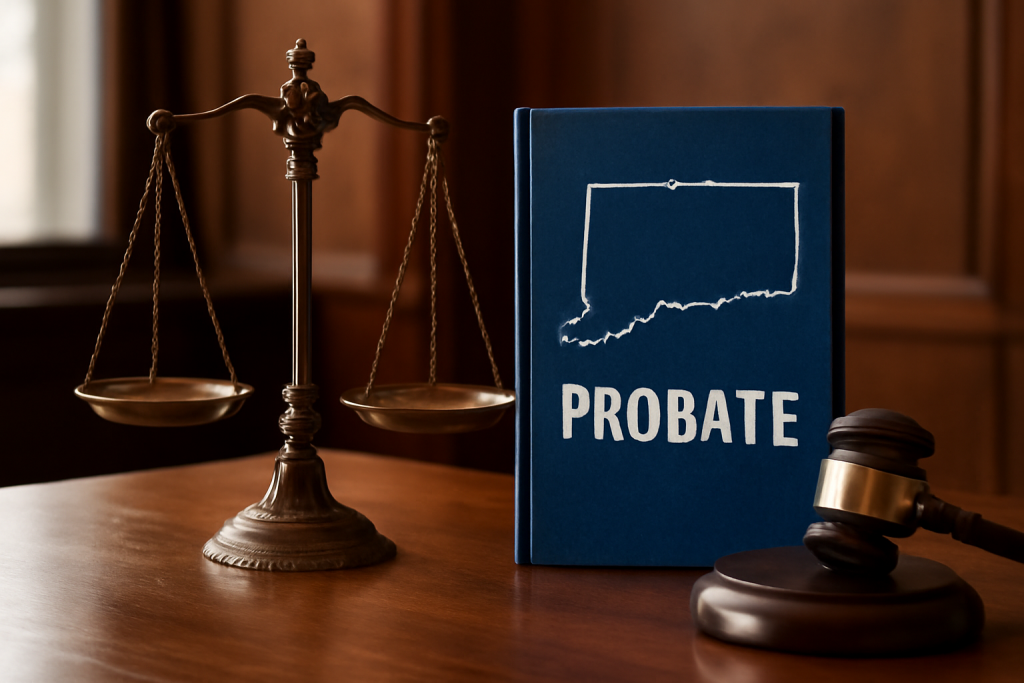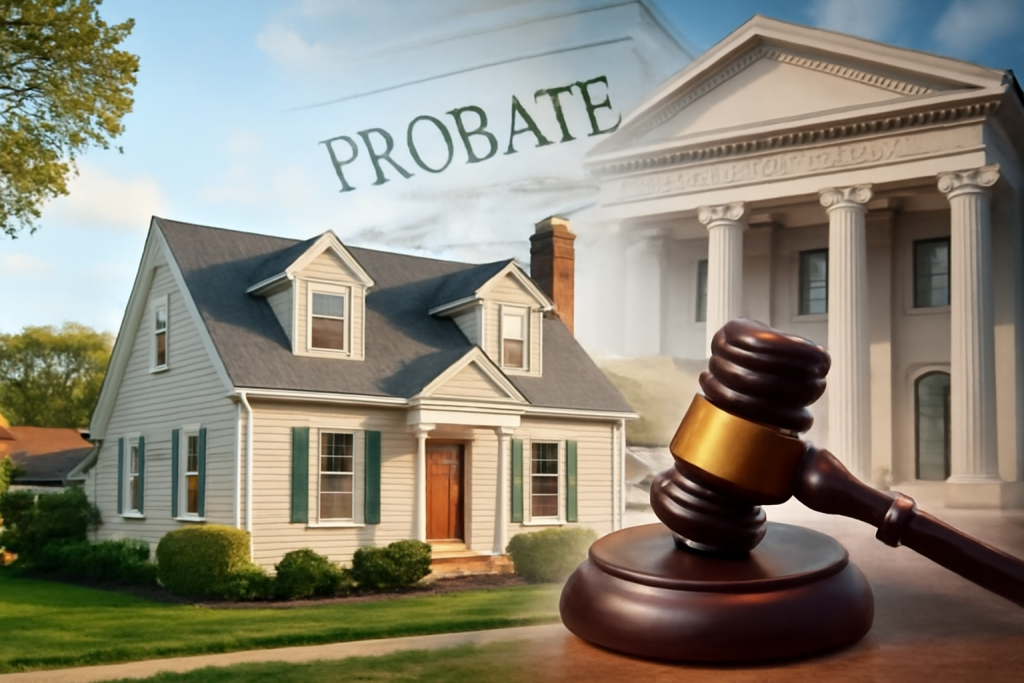Introduction
If you’re searching for information about the probate process in Connecticut, you are likely facing a challenging and emotional time. Probate, the legal process of distributing a deceased person’s estate, can often be overwhelming and confusing, especially if you’re dealing with a property that needs to be sold. You might be wondering how to navigate this process, what costs are involved, and how long it will take to close the estate. Perhaps you’re looking for a way to sell the house quickly or avoid the complications that often arise in probate. Whether you’re an heir, executor, or beneficiary, your priority is probably to understand how you can move forward in the most efficient and stress-free way possible, and you may be wondering if selling the probate house for cash is the best solution.
As you read through this guide, you’ll gain a better understanding of what probate is, how it works in Connecticut, and most importantly, how to make the process smoother. The ultimate goal is to help you understand the steps involved and the alternatives available—like selling your house for cash to an investor—that could save you time, money, and stress.
What is the Probate Process in Connecticut?

When a loved one passes away and leaves behind a property in Connecticut, the probate process ensures that their estate is handled according to the law. For heirs and beneficiaries, this process can feel like navigating a maze. Probate in Connecticut begins when a petition is filed with the court to begin the legal process of administering the deceased person’s estate. This involves validating their will (if one exists) and distributing their assets, including real estate, to beneficiaries or heirs.
However, the probate process can take several months and, in some cases, even years. If you’re here because you’re wondering how this affects the property left behind, you’re likely concerned about whether the house is tied up in probate, the costs associated with keeping the property, and how to move forward with selling it.
Probate in Connecticut typically involves several steps:
- Filing the Will: If there is a valid will, the court will validate it. If there isn’t a will, Connecticut’s laws of intestate succession distribute the estate.
- Appointing an Executor or Administrator: The court will appoint an executor if there’s a will or an administrator if there isn’t one.
- Identifying and Inventorying Assets: This includes the house and any other property.
- Paying Debts and Taxes: The estate is responsible for any outstanding debts or taxes.
- Distributing the Estate: After settling the debts, the executor distributes the remaining assets to the heirs.
Selling the house in probate may seem like a good way to move forward, especially if there are financial obligations attached to the property or if the estate needs liquidity. That’s where the question comes in: Can You Sell a House in Probate in Connecticut? The answer is yes, but it requires court approval.
Can You Sell a House in Probate in Connecticut?
Yes, you can sell a house in probate in Connecticut. However, the process is more complicated than a typical sale. Probate properties must go through the court’s approval process before they can be sold. This is because the executor or administrator of the estate is required to follow the guidelines set by the court to ensure that the sale is handled properly.
In some cases, an executor can sell a property without court approval if the will specifically grants them that power. Otherwise, court approval is necessary to make the sale legally binding. As an heir or executor, you may feel like you’re in a hurry to sell, either to resolve debts or distribute assets among beneficiaries. This can lead to frustration as the probate process can slow things down.
If you’re considering selling during probate, keep in mind that the timeline for a sale could be longer than a standard sale, especially if there are complications with the estate or if the probate court becomes involved. It’s essential to work with a knowledgeable attorney to navigate this process and avoid unnecessary delays.
For those wanting a faster route, selling a probate home for cash in Connecticut might be an attractive option. Cash buyers can purchase the house quickly, often bypassing the delays caused by the probate process.
Can You Sell a House in Probate in Connecticut? is a question that many will need to answer early in their probate journey, and understanding this critical step will ensure you know what to expect.
Benefits of Selling a Probate House for Cash in Connecticut
Selling a probate house for cash in Connecticut can be highly advantageous for several reasons. If you find yourself bogged down by probate issues or if you’re looking to sell a house as-is, cash sales are often the fastest and least complicated option. The benefits of selling a probate house for cash include:

- Speed: One of the biggest benefits of selling a probate house for cash is the speed. Typically, cash offers can close much faster than traditional sales, often in as little as a week or two. This is especially beneficial when you’re facing mounting probate costs or want to avoid ongoing property maintenance.
- No Repairs Needed: Probate homes often come with a list of repairs and updates. However, selling your house as-is means you don’t need to worry about fixing up the property to make it market-ready. Cash buyers often prefer homes that don’t require renovations, meaning you can sell without lifting a finger.
- No Realtor Fees: When you sell your house without a realtor, you avoid commission fees, which can range from 5% to 6% of the sale price. This means more money in your pocket after the sale.
- Certainty: Cash sales are usually less likely to fall through than traditional sales. In a traditional sale, buyers may back out due to financing issues, but with cash, the deal is much more secure.
- Simplicity: Working with a house buying company near me that specializes in probate can simplify the process, as they are experienced in dealing with probate cases and can guide you through the legalities involved.
The Benefits of Selling a Probate House for Cash in Connecticut are clear, and understanding these can save you time, money, and stress when dealing with a complex probate property.
Common Challenges When Selling a Probate Home in Connecticut
While selling a probate home can be beneficial, there are also several common challenges that come with the territory. Understanding these issues upfront can help you make informed decisions and avoid pitfalls:
- Court Approval Delays: As mentioned earlier, most probate sales require court approval. The process of getting this approval can take time—anywhere from several weeks to months. These delays can be frustrating if you’re trying to sell quickly or if you need the money to resolve debts.
- Unclear Ownership: Probate properties can sometimes involve multiple heirs or beneficiaries, and disputes over ownership may arise. If the beneficiaries disagree, it can slow down the sale or even prevent it from happening altogether.
- Outstanding Debts: If the estate has significant debts, it can complicate the sale of the home. The estate must pay off any liabilities before selling the property, which could reduce the proceeds from the sale.
- Market Conditions: Selling any home, especially a probate home, depends on current market conditions. If the housing market is slow, it may be difficult to sell the house at a good price, further complicating the probate process.
By being aware of these common challenges and weighing your options, you can determine whether selling the probate property through traditional methods or opting for a cash sale is the better solution.
If you’re looking to sell fast and avoid some of these challenges, you might want to consider working with a cash home buyer who specializes in probate properties. Common Challenges When Selling a Probate Home in Connecticut can be minimized by choosing the right path, especially if speed and simplicity are important to you.
Steps to Sell a House in Probate Fast in Connecticut
If you want to sell a house in probate fast in Connecticut, the process can feel overwhelming, but there are steps you can take to streamline the sale. Here’s how to get started:

- Consult an Attorney: Probate laws in Connecticut can be complex. Before making any decisions, it’s wise to consult with a probate attorney who can help you navigate the legal aspects of selling a probate home.
- Get a Probate Valuation: You’ll need to have the property appraised to determine its value for tax purposes. This step can help ensure you get a fair price for the house.
- Prepare for Court Approval: In Connecticut, most probate property sales require court approval. Work with your attorney to prepare the necessary paperwork and attend any required hearings to secure approval for the sale.
- Consider a Cash Buyer: If speed is a priority, consider selling to a house buying company near me. They can make a fair cash offer quickly and close the deal in a matter of weeks.
- Close the Deal: Once everything is in order, finalize the sale with the buyer. The transaction will be relatively simple, especially if you’re selling for cash.
By following these steps, you can sell your house fast in probate and move on to the next chapter of your life.
Steps to Sell a House in Probate Fast in Connecticut can make the process smoother by showing you how to expedite the sale.
How to Avoid Probate Scams in Connecticut
Probate is a sensitive time, and unfortunately, scammers often target people dealing with probate properties. Whether it’s an unscrupulous buyer offering an unfair price or a company pretending to offer a “quick fix,” it’s important to be vigilant. To avoid probate scams in Connecticut, always work with professionals who have a solid reputation.
Look for licensed house buying companies near me and verify their legitimacy. Be cautious of unsolicited offers, especially if they promise to buy your house quickly without a legitimate reason. Work with a trusted attorney to handle the probate process legally and fairly.
How to Avoid Probate Scams in Connecticut is crucial for ensuring you don’t fall victim to fraudulent activities during a vulnerable time.
How Long Does Probate Take in Connecticut?
One of the most pressing questions when selling a probate home is: How long does probate take in Connecticut? The probate process can take anywhere from several months to over a year, depending on the complexity of the estate and any disputes among heirs. The process includes several steps, including asset inventory, debt payment, and court hearings.
If you’re looking to sell the house quickly, this extended timeline can be frustrating. That’s why many people opt to sell their probate property for cash to avoid the delays associated with traditional sales.
If you need quick closure, understanding how long probate takes is vital in deciding whether waiting for a sale through the court system or going the cash sale route is better for you.
How Long Does Probate Take in Connecticut? is an important piece of information that will guide your decision-making process.
How to Find the Right Buyer for a Probate Property in Connecticut

Selling a probate property in Connecticut can be stressful, especially if you’re looking to settle the estate quickly. One of the most important decisions you’ll make is finding the right buyer for the property. Whether you choose a cash buyer or a traditional buyer, it’s essential to choose wisely.
A cash buyer is often the best option for probate properties. These buyers specialize in purchasing homes quickly, often closing in just a few weeks. The benefit of working with a house buying company near me is that they can streamline the process and handle all the probate-specific complexities, such as court approval or multiple heirs. This makes them ideal for sellers who want a fast and hassle-free transaction.
When selecting a cash buyer, ask for references or testimonials from previous clients. A reputable cash buyer should have a history of handling probate sales with integrity. If you’re considering a traditional buyer, keep in mind that mortgage lenders may require additional inspections and appraisals, which can delay the process.
Another significant advantage of cash buyers is that they usually purchase properties as-is. This means you don’t need to worry about making repairs or preparing the house for showings. The buyer will purchase the property in its current condition, saving you both time and money.
For more on the benefits of selling as-is, visit this helpful guide from Bankrate: Selling a Home As-Is.
How to Handle Multiple Heirs When Selling a Probate Property in Connecticut
Handling multiple heirs when selling a probate property in Connecticut can be challenging, particularly if there’s disagreement over the sale or how proceeds should be divided. If the will clearly specifies how the property should be managed, that can provide a clear path forward. However, if the will is ambiguous, or there are multiple beneficiaries who disagree on the sale, the process can become complex.
The first step in dealing with multiple heirs is clear communication. Make sure all parties are aware of the current situation and understand the legal requirements of selling the property. It’s essential to keep everyone informed and involved in decision-making. If there’s a significant dispute, consider seeking professional mediation to resolve conflicts.
In cases where multiple heirs are involved, it’s helpful to have an impartial third party—such as an attorney or the probate court—manage the sale process. This can ensure that all parties are treated fairly and that the sale proceeds without unnecessary delays. Probate court oversight can also prevent one heir from trying to dominate the decision-making process.
For families that want to sell the property quickly, working with a house buying company near me can be a good solution. These companies are experienced in probate transactions and can help simplify the process, especially when multiple heirs are involved. They also tend to be flexible when it comes to dealing with court approvals and other legal formalities.
What Happens If a Probate Property Doesn’t Sell in Connecticut?
If a probate property doesn’t sell in Connecticut, it can create significant delays and complications in settling the estate. If the house remains unsold for an extended period, the estate might continue to incur costs, such as property taxes, maintenance, and insurance. These costs become burdensome, especially when the estate has other financial obligations that need settlement.
If the probate property isn’t selling because of market conditions or the property’s condition, the first step is to reassess the price. The probate court often sets an initial sale price, but if it doesn’t attract interest, a price reduction might be necessary to make the property more appealing to buyers. For advice on how to properly price a property during probate, check out this resource from Zillow: How to Price Your Home for Sale.
If a traditional sale isn’t working, selling the property as-is to a cash buyer can be a viable solution. Cash home buyers are often more interested in purchasing properties that need repairs and are usually not deterred by the probate status of the property. These buyers can provide a quicker and simpler path to selling the home, especially when you’re trying to avoid the ongoing costs of holding onto the property.
If the property still doesn’t sell, the court may need to take further action, such as ordering a public auction, or the heirs may decide to adjust how the property is managed within the estate. However, a cash sale typically avoids many of these complications, offering a fast and hassle-free alternative to traditional sales.
Conclusion
The probate process in Connecticut can be lengthy and complex, making it a challenging experience for anyone involved. However, by understanding the steps involved and exploring your options, such as selling your house for cash, you can avoid many of the delays and headaches associated with traditional probate sales. While probate can be an essential part of settling an estate, sometimes the fastest and most hassle-free way to move forward is to sell your house to an investor who specializes in these types of transactions. This approach can save you time, money, and a lot of unnecessary stress.
If you’re looking for a quick, fair, and straightforward solution, consider reaching out to KD Buys Houses. Our team specializes in helping homeowners navigate the probate process, and we offer cash offers for homes in probate. We make selling your home easy, fast, and without the complications of traditional sales. Let us help you move forward with a fair cash offer and close on your timeline. Contact KD Buys Houses today to learn how we can assist you with your probate property.
